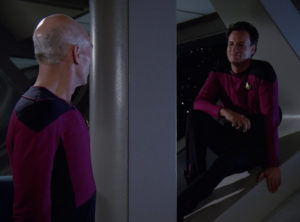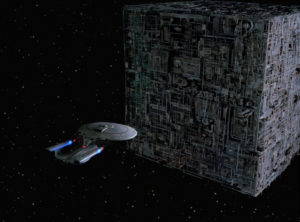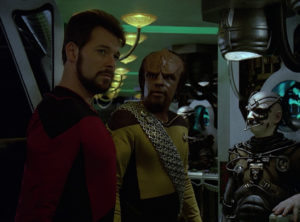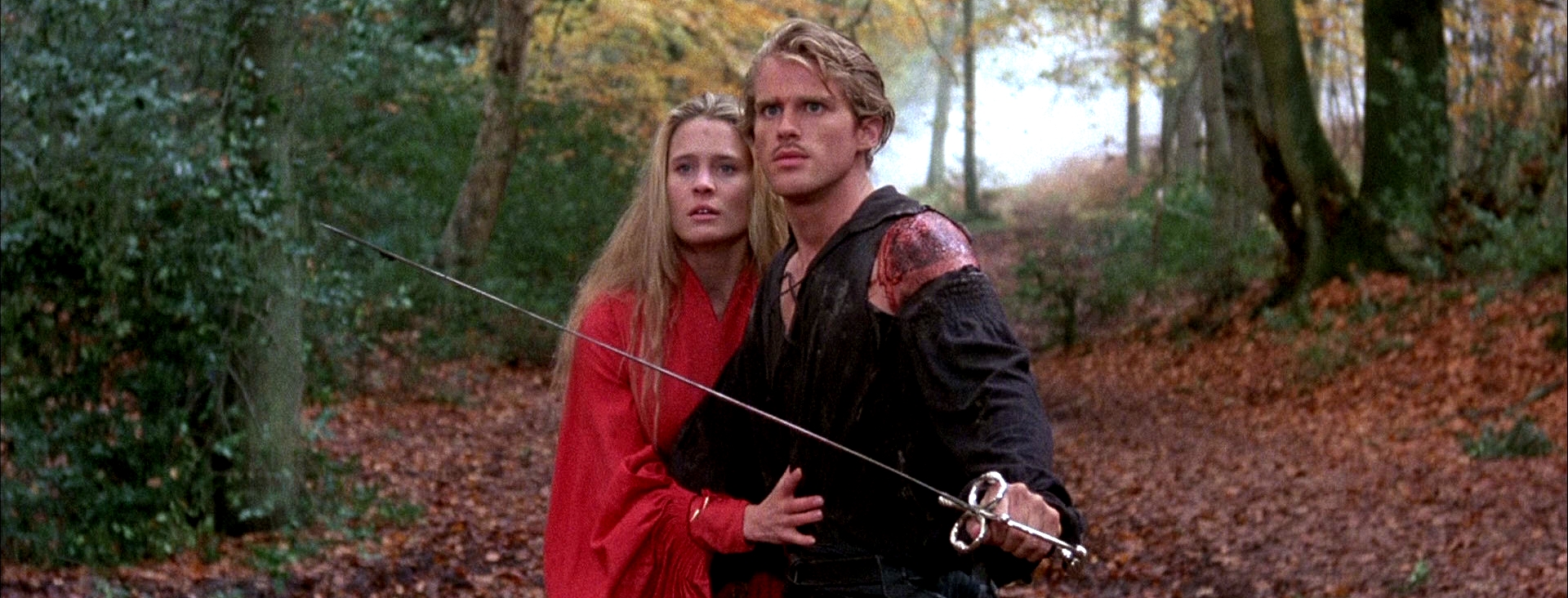Series Overview:
Thirty years ago, Star Trek: The Next Generation embarked on a journey that would solidify the popularity of a franchise, redefine science fiction entertainment, and take us on some incredibly cool, wholly memorable journeys. With so many great, genre-defining episodes it’s impossible to sum up the series in a handful of paragraphs. But despite being broadcast in an era where serialized storytelling wasn’t as prevalent as it is today, it’s the overarching story of TNG that allows us to examine it as a whole.
There’s such an enormity of great stories in The Next Generation (TNG) that one could write a thesis on most of them. [Check out “Trektember” over at Redeeming Culture for some great episodic reviews]. In discussing the series as a whole, however, I believe we find a road map in the crew’s dealings with Q, everybody’s favorite immortal jester in the court of Picard. His humorous yet insightful musings on human nature are the very essence of what Star Trek seeks to convey. Star Trek might be set amidst the idea of space exploration, but it is ultimately exploring who we are as human beings.
Space is not the final frontier. The first and last frontier we have to discover is ourselves.
So strap in, set phasers to stun, beam yourself up (ok I’m done) and follow us as we tackle TNG as best we can in a four-part series that examines the weaving story and the wondrous exploration experienced by the crew of the Enterprise NCC 1701-D.
Find all four parts here:
Part 1 – Encounter at Far Point and Human Nature
Part 2 – Q Who and The Nature of Calling
Part 3 – Tapestry and our Personal Natures
Part 4 – All Good Things… and Our Eternal Purpose
Part 2 – Q Who and The Nature of Calling
Q: This ship is already home for the indigent, the unwanted, the unworthy. Why not for a homeless entity?
That’s my boy, Q. He always gets it, even when he doesn’t. Continuing our reflection on the thematic examinations of TNG through the eyes of Q, we come to a question I find myself asking just as Q once asked to the crew- how dare we? What makes us mortals think we have what it takes to seek out what’s beyond the stars? The answer, simply, is faith. Scripture shows us that belief in the eternal should only lead us toward (not away from) bold scientific explorations, something the crew of the Enterprise happen to specialize in. How perfect, then, that we find this little ship full of a diverse community aiming squarely for what’s beyond.
 In this episode, Q arrives to become a part of that little community. Something laughable because we know he’s hiding something, but its telling of Q’s true desires. He bothers this crew enough that it’s obvious he suffers from a bit loneliness, which is further explored in the season three episode Déjà Q. His idea to be needed drives this episode, and while it seems petty, it’s done for a greater reason. After Picard refuses Q’s offer to join the crew, and haughtily casts off the notion that the Federation is unprepared for what lies ahead, Q gives them yet another test and flings them off to the deep reaches of the Delta Quadrant. And here, we meet the Borg.
In this episode, Q arrives to become a part of that little community. Something laughable because we know he’s hiding something, but its telling of Q’s true desires. He bothers this crew enough that it’s obvious he suffers from a bit loneliness, which is further explored in the season three episode Déjà Q. His idea to be needed drives this episode, and while it seems petty, it’s done for a greater reason. After Picard refuses Q’s offer to join the crew, and haughtily casts off the notion that the Federation is unprepared for what lies ahead, Q gives them yet another test and flings them off to the deep reaches of the Delta Quadrant. And here, we meet the Borg.
Picard: Eighteen of our people have died. Please, tell us this is one of your illusions.
Q: Oh, no. This is as real as your so-called life gets.
 Whew, the Borg are still totally scary to this day. All consuming, emotionless and merciless. The idea of an entity built only for consumption and destruction calls on all our fears. Their first appearance is simply one of the most terrifying reveals in the entire series. The Borg cube appears for the first time and looms in the vacuum of space like a floating haunted house, quiet and dark. Data describes it so generalized, no specifics, no lifeforms. It’s the epitome of terror of the unknown, and it’s a true illustration of what the Federation dares to explore.
Whew, the Borg are still totally scary to this day. All consuming, emotionless and merciless. The idea of an entity built only for consumption and destruction calls on all our fears. Their first appearance is simply one of the most terrifying reveals in the entire series. The Borg cube appears for the first time and looms in the vacuum of space like a floating haunted house, quiet and dark. Data describes it so generalized, no specifics, no lifeforms. It’s the epitome of terror of the unknown, and it’s a true illustration of what the Federation dares to explore.
A funny thing happens, though. Rather than high tail it and run, the crew decides to explore this unknown despite Q’s warnings as to the risks. Their compulsion is to their calling, and that’s something we as Christians should emulate. Grace has set us free to live boldly. The Apostle Paul spent a lot of time reminding people about that in his letters. Because our actions do not condemn us, we can live without fear. Dare I say, even without fear of the Borg. Therefore, we are called to pursue things like scientific exploration in all its forms.
Q: If you can’t take a little bloody nose, maybe you ought to go back home and crawl under your bed. It’s not safe out here. It’s wondrous, with treasures to satiate desires both subtle and gross, but it’s not for the timid.
Here we see the choice that Captain Picard is faced with every time he says “engage” to the helmsman: face the unknown and risk the ship, or run to safety and learn nothing. We know what the answer will always be, and so does Q. His test, as Picard later ponders with Guinan, accomplished the right thing through the wrong means (which, you know, is always Q’s problem). Picard doesn’t fear the unknown, but perhaps he didn’t respect it enough. Wisdom is necessary when answering a call, but not to the point of complacency. God has given us a spirit of power, love and sound mind. That last part is just as important, and is what we see put to the test against the first of many meetings with the Borg.
 What is so remarkable to me about Star Trek, and likely why it has stuck with me my entire life, is that it continually illustrates people embracing their calling so fully. The calling of a Starfleet crew is to wade in no matter the cost. This is profoundly gospel-centric in nature. A trek through the stars as selfless and fearless as this is exactly what the calling of a Christian should look like. What other conclusion could we draw from a theology that believes life is just the beginning? Creation is wondrous, and yes, it is dangerous too, but if we believe in life eternal then we should absolutely seek out that wonder with abandon.
What is so remarkable to me about Star Trek, and likely why it has stuck with me my entire life, is that it continually illustrates people embracing their calling so fully. The calling of a Starfleet crew is to wade in no matter the cost. This is profoundly gospel-centric in nature. A trek through the stars as selfless and fearless as this is exactly what the calling of a Christian should look like. What other conclusion could we draw from a theology that believes life is just the beginning? Creation is wondrous, and yes, it is dangerous too, but if we believe in life eternal then we should absolutely seek out that wonder with abandon.
There are a great many more explorations of the Enterprise-D answering the call throughout TNG. Yesterday’s Enterprise brings back Tasha Yar to see her yet again sacrifice her life for her calling. Data’s long journey towards being more human sees him struggling with his calling, particularly in the episode Brothers. But the most sobering reminder of how we should approach our calling is found at the beginning of every episode in the series (and the Original Series as well). I’ll leave you with that famous phrase as both a reminder and an exhortation: “To boldly go where no one has gone before…”



4 comments